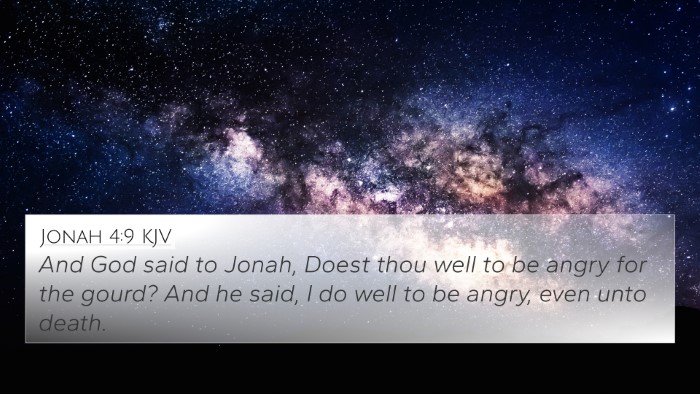Old Testament
Genesis Exodus Leviticus Numbers Deuteronomy Joshua Judges Ruth 1 Samuel 2 Samuel 1 Kings 2 Kings 1 Chronicles 2 Chronicles Ezra Nehemiah Esther Job Psalms Proverbs Ecclesiastes Song of Solomon Isaiah Jeremiah Lamentations Ezekiel Daniel Hosea Joel Amos Obadiah Jonah Micah Nahum Habakkuk Zephaniah Haggai Zechariah MalachiJob 18:4 Similar Verses
Job 18:4 Cross References
He teareth himself in his anger: shall the earth be forsaken for thee? and shall the rock be removed out of his place?
Uncover the Rich Themes and Topics of This Bible Verse
Listed below are the Bible themes associated with Job 18:4. We invite you to explore each theme to gain deeper insights into the Scriptures.
Job 18:4 Cross Reference Verses
This section features a detailed cross-reference designed to enrich your understanding of the Scriptures. Below, you will find carefully selected verses that echo the themes and teachings related to Job 18:4 KJV. Click on any image to explore detailed analyses of related Bible verses and uncover deeper theological insights.

Job 14:18 (KJV) »
And surely the mountains falling cometh to nought, and the rock is removed out of his place.

Job 16:9 (KJV) »
He teareth me in his wrath, who hateth me: he gnasheth upon me with his teeth; mine enemy sharpeneth his eyes upon me.

Mark 9:18 (KJV) »
And wheresoever he taketh him, he teareth him: and he foameth, and gnasheth with his teeth, and pineth away: and I spake to thy disciples that they should cast him out; and they could not.

Jonah 4:9 (KJV) »
And God said to Jonah, Doest thou well to be angry for the gourd? And he said, I do well to be angry, even unto death.

Ezekiel 9:9 (KJV) »
Then said he unto me, The iniquity of the house of Israel and Judah is exceeding great, and the land is full of blood, and the city full of perverseness: for they say, The LORD hath forsaken the earth, and the LORD seeth not.

Isaiah 54:10 (KJV) »
For the mountains shall depart, and the hills be removed; but my kindness shall not depart from thee, neither shall the covenant of my peace be removed, saith the LORD that hath mercy on thee.

Job 40:8 (KJV) »
Wilt thou also disannul my judgment? wilt thou condemn me, that thou mayest be righteous?

Luke 9:39 (KJV) »
And, lo, a spirit taketh him, and he suddenly crieth out; and it teareth him that he foameth again, and bruising him hardly departeth from him.
Job 18:4 Verse Analysis and Similar Verses
Meaning of Job 18:4
Job 18:4 states, "You that tear yourself in your anger, shall the earth be forsaken for you? Or shall the rock be removed out of its place?" This verse is part of Bildad's response to Job, who has been lamenting his suffering and the loss of his former happiness. The chapter serves to explore the consequences of human actions, especially when under divine scrutiny.
Overview of the Verse
In this verse, Bildad chastises Job for his excessive self-pity and anger. He emphasizes the steadfastness of the earth and the constancy of creation, suggesting that Job's turmoil does not alter the fundamental truths of existence. The rhetorical question posed challenges Job’s perspective, inviting him to reflect on the futility of his anger.
Commentary Insights
The following insights summarize the interpretations provided by several public domain commentaries:
- Matthew Henry: Henry elucidates that Bildad is essentially stating that natural laws remain unchanged regardless of human wrath. Job's anger, while understandable given his suffering, should not distort his perception of reality; the earth maintains its course, and God remains sovereign.
- Albert Barnes: Barnes points out that Bildad emphasizes the folly of angry self-absorption. He implies that Job's emotional distress does not disrupt the cosmic order. The idea here is to remind Job that his suffering should lead him to humility rather than intense self-absorption.
- Adam Clarke: Clarke suggests that Bildad's words highlight the need for moderation in Job's emotional expression. The verse serves as a reminder that feeling despondent should not lead to despair; rather, it should prompt one to seek understanding and solace in God’s grace.
Thematic Connections
Job 18:4 connects thematically with verses discussing divine stability and the nature of human hearts:
- Psalms 104:5: "The Lord established the earth upon its foundations, so it will never move." This underlines the unchanging nature of God’s creation.
- Isaiah 40:8: "The grass withers, the flower fades; but the word of our God will stand forever." This reminds Christians of the eternal nature of God's decree over human circumstances.
- Proverbs 14:29: "Whoever is slow to anger has great understanding, but he who has a hasty temper exalts folly." A link is drawn between anger and wisdom or folly
- James 1:20: "For the anger of man does not produce the righteousness of God." This correlates with Job’s emotional state and Bildad’s admonitions.
- Ecclesiastes 7:9: "Be not quick in your spirit to become angry, for anger lodges in the heart of fools." This reflects the folly of Job’s situation as inferred from Bildad's reproach.
- Proverbs 16:32: "Better a patient person than a warrior, those with self-control than those who take a city." Here, self-control is emphasized over anger.
- Hebrews 12:1: "Therefore, since we are surrounded by so great a cloud of witnesses, let us also lay aside every weight, and sin which clings so closely." This scripture encourages believers to persevere in faith rather than succumb to anger.
Cross-Referencing Insights
This verse encourages a broader understanding through cross-referencing. Below are some key connections:
- Job 1:22: "In all this Job did not sin or charge God with wrong." Job’s initial response to suffering showcases how a faithful heart may respond despite deep anguish.
- Job 5:17: "Blessed is the one whom God corrects; so do not despise the discipline of the Almighty." This ties into the theme of embracing hardship as a learning process.
- Proverbs 3:11-12: "My son, do not despise the Lord’s discipline, and do not resent his rebuke, because the Lord disciplines those he loves, as a father the son he delights in." This reflects the notion of divine love in correction.
- Romans 12:19: "Beloved, never avenge yourselves, but leave it to the wrath of God, for it is written, 'Vengeance is mine, I will repay, says the Lord.'" This verse closely relates to Job’s response and the futility of anger.
Understanding through Context
The context of this verse in the Book of Job is critical. The dialogues between Job and his friends reveal much about human suffering, divine justice, and the limits of human understanding. Bildad's speech is an attempt to comfort Job but often contributes to his suffering instead. This shows how even well-intended words can fail to grasp the complexities of someone’s pain.
Conclusion
Job 18:4 serves as a poignant reminder of the relationship between human emotions and divine providence. It encourages readers to reflect on the impact of anger and despair, and to maintain a perspective that acknowledges God's sovereignty amid trials. The thematic connections and cross-referencing with other biblical texts enhance the understanding of Job’s plight and the nature of human struggles in faith.





